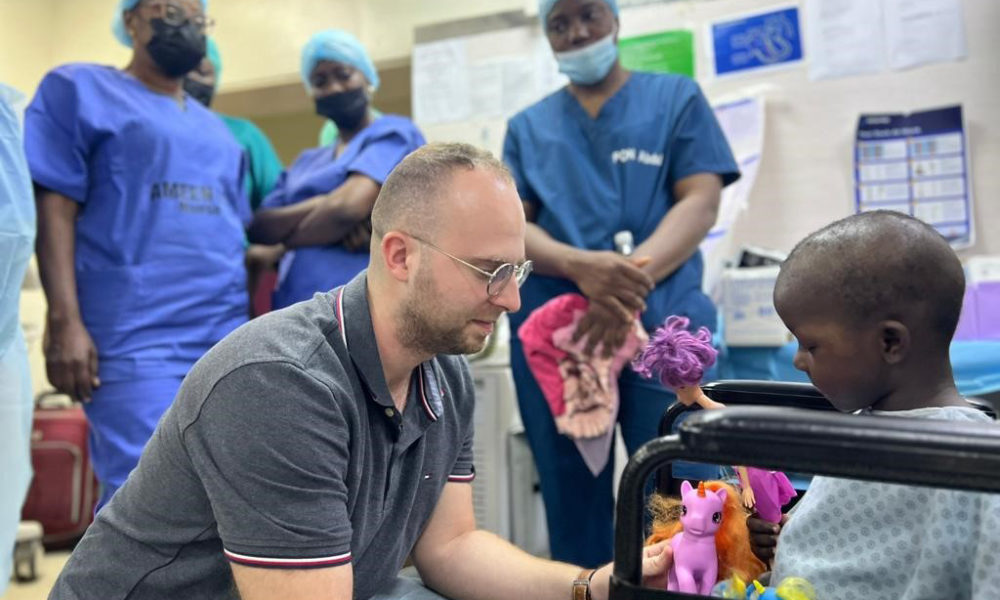Banner
Israeli doctors save Nigerian lives with critical eye treatment

A three-month-old Nigerian baby girl with critical eye cancer this week underwent potentially life-saving treatment by a team of specialised Israeli doctors in the African country. This follows a humanitarian mission conducted by Israeli physicians from Sheba Medical Center who performed an intricate eye procedure on both the tiny baby’s eyes, giving her much needed hope of survival.
“The procedure went off successfully,” said Israeli ophthalmologist, Dr Mattan Arazi, speaking to the SA Jewish Report from Nigeria.
Sheba Medical Center this week sent five specialised doctors to Ilona, Nigeria, to treat several children with life-threatening retinoblastoma – an eye cancer in infants and young children – which can be deadly if not treated early. Retinoblastoma is a malignant tumour that originates in the retina of young children. The vast majority of cases present before the age of five.
It’s estimated that one in 15 000 Nigerian children are inflicted with paediatric ocular cancer – amounting to a few hundred children a year.
The five-day mission included training local medical teams. The doctors also established an intra-arterial chemotherapy (IAC) centre, which will continue to provide much needed care for eye-cancer patients in the region.
The team consists of five specialists led by Professor Ido Didi Fabian, an ocular oncology specialist at the Goldschleger Eye Institute of Sheba Medical Center. “IAC is a highly effective treatment modality that can make a significant difference in the outcome of cancer treatment. It’s something that we have a lot of experience with at Sheba,” he said.
Intra-arterial chemotherapy, he said, is a treatment option for certain types of cancer that involves delivering chemotherapy directly to the tumour through a catheter inserted into an artery. This allows for higher doses of chemotherapy to be delivered directly to the tumour, while minimising the exposure of healthy tissue to chemotherapy drugs.
“The treatment for retinoblastoma has evolved. It has become treatable and curable in high-income countries in places like North America, Europe, and in Israel, with all the modern facilities available. In low-income countries, in Africa for example, children still die [from it]. There’s no real reason for that when we can make a difference,” he said.
“Together with my colleagues, I’m honoured to have the opportunity to share our knowledge and skills with our local colleagues in Nigeria, and to work together to treat infants with this life-saving treatment,” Fabian said. He was originally contacted by his Nigerian colleague, Professor Dupe Ademola-Popoola, the head of paediatric ophthalmology at Ilorin Teaching Hospital in Nigeria, to assist in creating an IAC centre.
After months of logistical planning, the doctors finally arrived on Monday, 9 January, and set to work.
“Our first patient was this baby girl who had bilateral retinoblastoma,” Arazi said. “In one eye, she had advanced retinoblastoma and in the other, she had already received local therapy and was a good candidate for IAC treatment. So, as a group of Nigerian and Israeli physicians, we discussed the treatment, and we successfully treated both eyes at the same time.” He described a sense of “excitement and hope” following the procedure.
Arazi said a Nigerian doctor guided by the Israeli team successfully treated another patient with the procedure. “This was exciting news, I saw Dr Fabian afterwards and I could see the joy in his eyes.”
Proper delivery of intra-arterial chemotherapy requires the co-operation of an integrated team including ocular oncologist, skilled neurointerventional radiologist, anaesthesiologist, paediatric oncologist, and other vital ancillary staff. For each patient, a detailed plan is put in place before initiating this therapy, sometimes referred to as chemosurgery.
It involves precision as the femoral artery is accessed and a guide wire and microcatheter is used to access the vascular supply to the eye.
According to the Israeli doctors, the five-day mission aims to improve health outcomes for paediatric eye-cancer patients in the area and to increase capacity for long-term quality optical care in Nigeria.
The mission is part of Sheba’s global-impact initiative, dedicated to building bridges to prosperity through healthcare, innovating to implement cutting-edge health solutions globally, and fostering critical relationships to strengthen fragile healthcare systems.
Said Arazi, “Nigeria has one of the highest rates of retinoblastoma. The treatment worldwide varies, but survival reaches up to 90% with things like intravenous chemotherapy and intra-arterial chemotherapy, which is a relatively new treatment modality.”
Asked whether the baby girl will retain health and vision in both her eyes, he said, “It’s hard to say. She will need to be evaluated in a few weeks and will most likely need additional IAC treatments, which the Nigerian physicians can now do. The situation is hopeful.”
“Our commitment and dedication to extending a hand to those in need across the globe is a fundamental guiding principle for us,” said Yoel Har-Even, the director of the international division and resource development, Sheba Global, at Sheba Medical Center. “The mission to Nigeria features some of the most talented physicians we can offer, enabling us not only to treat many patients but to sow the seeds for future advancement in the region. There’s a great sense of pride in being able to contribute to humankind and offer hope without boundaries.”
Naomi Hadar, the executive director of Africa Friends of Sheba Medical Center in Johannesburg, said, “The purpose of the visit is to save babies’ and young children’s lives. There’s no reason for them to die, and our doctors are making the difference. This is part of the tikkun olam that we see as our contribution to the world.”